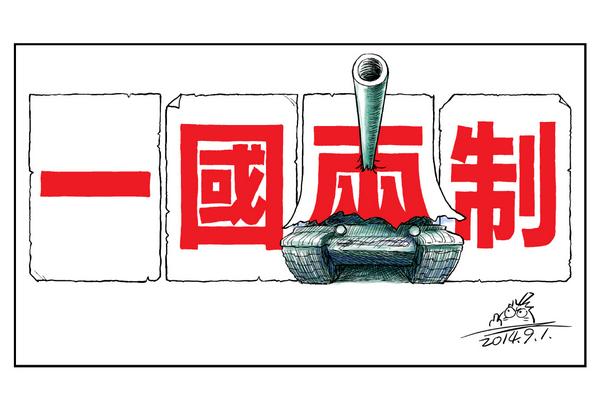In the run-up to the election for Hong Kong’s chief executive on March 26, Beijing has sent a strong signal that the final electoral decision is in China’s hands. At the current National People’s Congress session, Zhang Dejiang, the chair of the NPC and China’s top official in charge of Hong Kong issues, told delegates that Beijing has the right to intercede if the election does not go according to their plan. From Venus Wu and Clare Jim at Reuters:
Zhang Dejiang, chairman of the National People’s Congress, said it was important for the election to proceed smoothly and stressed the significance of the chief executive’s role as a link between Beijing and the Asian financial hub, according to the convener of the Hong Kong delegation to the congress, Maria Tam.
“It is a very important role, so the central government has the right to step in,” Tam told reporters in her summary of Zhang’s comments.
Zhang also warned the delegation during the annual parliamentary meetings in Beijing that Hong Kong should not allow politics to dominate life in the city.
He added that it was unfortunate that “street politics” had become a part of everyday life in Hong Kong while the neighboring Shenzhen city was catching up economically. [Source]
In 2014, widespread street protests in Hong Kong broke out after Beijing announced electoral reforms which would require all candidates for chief executive to be first vetted by a council that is predominately made up of representatives loyal to Beijing. After almost three months of demonstrations, participants did not extract any significant concessions from the authorities, but since then calls for greater autonomy from China have strengthened in Hong Kong, and in recent Legislative Council elections, a number of “localist” and pro-democracy candidates won seats. However, some of the elected legislators were barred from taking office after refusing to pledge support for a unified Hong Kong and mainland China. This in turn led to the NPC issuing a rare interpretation of Hong Kong’s Basic Law, stating that all officeholders in Hong Kong must pledge allegiance to Hong Kong as part of China. In its annual report on human rights conditions around the world, the U.S. Department of State called Beijing’s encroachment in Hong Kong, “the most important human rights problem reported,” in China.
At this week’s NPC sessions, Premier Li Keqiang spoke out against calls for independence in Hong Kong, as James Griffiths reports for CNN:
Speaking at the opening of the annual National People’s Congress, Premier Li Keqiang said calls from within the city to go it alone would “lead nowhere.”
This was the first time “Hong Kong independence” has ever been mentioned in any Chinese premier’s annual address.
“We will continue to implement, both to the letter and in spirit, the principle of ‘One Country, Two Systems’,” Li said, referring to the doctrine by which Hong Kong maintained certain freedoms and rights after it passed from British rule to Chinese in 1997.
“We pledge our full support to the chief executives and governments of (Hong Kong and Macau) in exercising law-based governance, growing their economies, improving people’s wellbeing, advancing democracy and promoting social harmony,” Li said. [Source]
So far, Beijing has backed former civil service head Carrie Lam in the chief executive election, making her the front runner, despite the relative popularity of John Tsang, the former Finance Minister. The pan-democrats on the 1,200 member election committee, which will cast the final vote, have said they will vote in a block for Tsang, while Lam is expecting the vote from the block aligned with Beijing.
The Economist looks at why Beijing is backing Lam:
It is not clear why Chinese officials are backing Mrs Lam so strongly. “I’m puzzled myself,” says Mr Tsang. (He had once been tipped as the favourite by local media, perhaps reading too much into his handshakes with China’s leader, Xi Jinping, at international gatherings.) It is possible that the party may worry about Mr Tsang’s exposure to the poisonous influence of America, where he lived in his teens and 20s (although Mrs Lam studied in Britain and has two sons and a husband who are British citizens).
More to the point, perhaps, is that Mr Tsang shows a bit too much interest in political reform. He describes the lack of progress with it as a “continual challenge to the government’s legitimacy”. The central government had offered to tweak the way the chief executive will be chosen this time: members of the public would be allowed to vote, but only for candidates approved by a committee like the current one. Pro-democracy legislators vetoed that plan two years ago. China has refused to countenance any other change. [Source]








